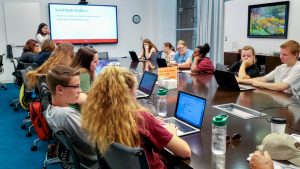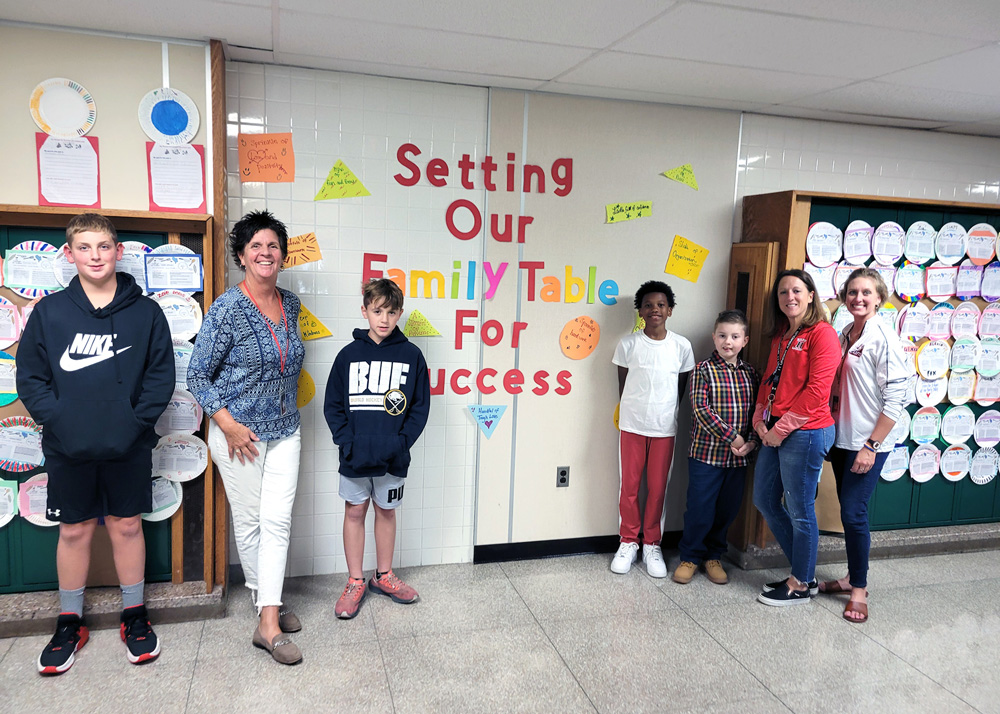Kids can test drive social media safely with new simulations
by Melanie Lefkowitz
Educators across the country can now use Cornell University-designed interactive tutorials to teach elementary and middle schoolers how to participate positively in social media – while simultaneously learning to navigate some of its potential perils.
The project’s goal is to prepare students to get the most out of social media in a controlled environment before they inevitably end up there in real life.
Social Media TestDrive, a project run by Cornell’s Social Media Lab in collaboration with the Bronfenbrenner Center for Translational Research, has partnered with Common Sense Education, a national leader in digital citizenship education, to release six Instagram-like simulations allowing students to learn new skills, try them out and reflect on them. The partnership gives TestDrive a national platform that will bring it into classrooms nationwide.
The tutorials launched August 12 as part of Common Sense Education’s new digital citizenship curriculum. Aimed at kids who are curious about social media but don’t yet have their own accounts, the lessons focus on privacy, digital footprints, cyberbullying, online identities, and fake news.
“What’s different about Social Media TestDrive is that it allows children to have a hands-on experience in a realistic social media environment,” said TestDrive primary investigator Natalie Bazarova, associate professor of communication and director of the Social Media Lab. “We believe it’s a novel and unique tool that offers the best of three worlds: interactivity and engagement of edutainment games, an instructional component of digital literacy curricula, and hands-on learning with interfaces and interactions similar to those found on real social media platforms.”
TestDrive offers educators and parents a tool to prepare kids to move safely and successfully into life online, said co-primary investigator Janis Whitlock, research scientist and associate director for teaching and training in the Bronfenbrenner Center.
“Social media is a nearly ubiquitous part of growing up for most modern teenagers,” Whitlock said. “Creating proactive ways to prepare kids for conscientious, positive, and safe ways of interacting online is critical.”
Each module begins with interactive tutorials illustrating key concepts about social media, such as “An upstander might confront the bully or tell a trusted adult,” or “What you and others share is permanent, and it’s easy to get caught in sharing things you might later regret.”
These are followed by examples of desirable responses, such as flagging a bullying post, writing a supportive comment to the target, or confronting the bully. Then, users participate in guided activities that allow them to practice these responses by following instructions and evaluating scenarios.
For example, a user named Lana posts, “Somebody help me with math,” and a commenter, Emma, replies, “Seriously, you should drop out or even repeat 7th grade if you can’t even deal with such an easy assignment.” The program suggests ways to help, such as commenting, “Lana, a lot of people think math is hard! Don’t worry about it.”
Students can then practice in the “free play” area of a realistic social media simulation, where they interact with preprogrammed, scripted bots that act and respond to their posts and comments. They can create posts from a library of photos and like, comment on or flag existing posts. Designed to seem realistic and relatable, the posts range from the benign (“Look at these brownies I made today!”) to the problematic (“First day of grade 7! Come to my house at 22 Eastwood dr if you want to hang!”)
The lessons conclude with questions designed to help learners reflect on what they learned in the simulation and how they can apply it in real life.
“If kids don’t know how to behave in a certain situation, it could lead to harmful results,” said Yoon Hyung Choi, a postdoctoral researcher and TestDrive’s content director and project manager. “These things can be tricky even for adults.”
In 2018, the team piloted TestDrive with more than 200 students through the Cornell Cooperative Extension and 4-H afterschool programs in New York state. In 2019 they tested a newer version with around 200 students nationwide through Common Sense Education.
“From a teacher’s perspective, they were clearly engaged, and they were taking it seriously,” said an eighth-grade teacher who participated in the pilot. “The conversation we had afterwards was rich.”
The TestDrive team is now working on six new simulations, informed by interviews with older students about what they wish they’d known earlier about social media. The team is talking with other potential partners and evaluating the newly launched modules.
“Assessing for changes in knowledge, skills and actual behaviors in a social media simulation will help us understand if TestDrive is working as we want it to, and how we can make it even more effective,” said Amanda Purington, a doctoral student in the Social Media Lab and director of evaluation and research for ACT for Youth in the Bronfenbrenner Center.
The research was supported by Jim and Becky Morgan and the National Science Foundation.

High school students provided feedback on Social Media TestDrive at 4-H’s Career Explorations event in June. Provided photo





